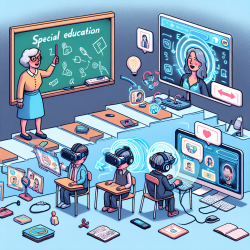The landscape of special education is undergoing a significant transformation, thanks to the advent of virtual therapy. This innovation is not just a fleeting trend; it is a revolutionary approach that is redefining how we provide essential services to students with special needs. As advocates for special education, it is crucial to understand the profound impact that online therapy services can have on our educational systems.
One of the most compelling aspects of virtual therapy is its accessibility. Traditional in-person therapy sessions often come with logistical challenges, including geographical limitations, scheduling conflicts, and the scarcity of qualified therapists. Online therapy services, such as those provided by TinyEYE, effectively eliminate these barriers. With just a computer and an internet connection, students can receive the support they need, regardless of their location.
Another significant advantage of virtual therapy is its flexibility. Schools and parents can schedule sessions at times that are most convenient for the student, thereby reducing disruptions to their academic routine. This flexibility extends to the types of services offered, from speech therapy evaluations to ongoing therapeutic sessions, ensuring that each student receives personalized care tailored to their unique needs.
Moreover, virtual therapy platforms often come equipped with advanced tools and resources that enhance the therapeutic experience. Interactive activities, real-time progress tracking, and secure communication channels between therapists, parents, and educators create a comprehensive support system for the student. These technological advancements not only improve the efficacy of the therapy but also foster a collaborative environment where all stakeholders can actively participate in the student's development.
However, the benefits of virtual therapy are not solely confined to logistical and technological advantages. The emotional and psychological impact on students is equally significant. Many children with special needs find comfort in the familiarity of their home environment, which can lead to more effective therapy sessions. The reduced stress and anxiety associated with traveling to a physical location can make a substantial difference in the student's overall well-being and progress.
It is also worth noting that virtual therapy can serve as a valuable tool for early intervention. By making speech therapy evaluations and other assessments more accessible, educators and parents can identify and address developmental issues at an earlier stage. Early intervention is critical in special education, as it can significantly improve long-term outcomes for students.
Despite the numerous advantages, it is essential to approach virtual therapy with a critical eye. Ensuring the quality and effectiveness of online therapy services requires rigorous standards and continuous evaluation. As advocates, we must demand that virtual therapy providers adhere to best practices and maintain a high level of professionalism. This includes proper credentialing of therapists, secure and confidential handling of student information, and the use of evidence-based therapeutic techniques.
In conclusion, virtual therapy is a game-changer in the field of special education. It offers unparalleled accessibility, flexibility, and technological advantages that can significantly enhance the quality of life for students with special needs. As we continue to navigate this evolving landscape, it is our responsibility to champion the use of online therapy services and ensure that they meet the highest standards of care. By doing so, we can provide our students with the tools and support they need to thrive, both academically and personally.
At TinyEYE, we are committed to delivering exceptional online therapy services that make a real difference in the lives of students. Our team of dedicated professionals is here to support you every step of the way. Together, we can revolutionize special education and create a brighter future for all students.










